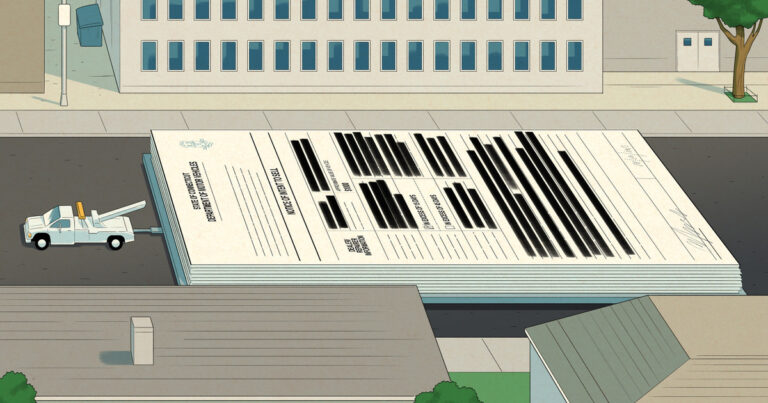This article was produced for ProPublica’s Local Reporting Network in partnership with The Connecticut Mirror and originally appeared in the Dispatches newsletter. Sign up to receive notes from journalists.
In the summer of 2022, I received a call from a source with information about towing. “When you learn more about how this works, it’s dizzying,” he said.
Connecticut has a more than 100-year history of allowing tow companies to sell a car within 15 days of taking it, provided they can convince the Department of Transportation that the car is worth less than $1,500. It turns out there is a law.
This period, which we learned by calling each state, is one of the shortest in the nation.
So I tried to answer what I thought was a simple question. How many cars did the towing company sell?
I filed a request with the DMV under the Connecticut Freedom of Information Act.
Two and a half years later, the DMV doesn’t even seem to know the answer. And we are still waiting for thousands of records.
In the fall of 2022, the DMV told me it would cost $47,000 to get the documents. Not only does it sound like list price for a new car, but it turns out it’s going to be a long battle. (The DMV now says that estimate was incorrect.)
Initial estimate of cost to obtain documents from the Connecticut Department of Transportation. Credit: Retrieved from CT Mirror and ProPublica.
We were looking for a one-page form called an H-100 that a towing company must file with the DMV to get permission to sell someone’s car. These forms can help you learn a lot of information, including which companies are trying to sell your car quickly and how the DMV is responding to those requests.
Obtaining documentation was key to learning about Connecticut’s towing practices and the real impact they have on people’s lives.
After asking the DMV to itemize the $47,000 charge, we asked our attorney to file an appeal with the Freedom of Information Commission. Our attorneys negotiated a compromise in April 2023. We agreed to pay $1,900 to cover the agency’s costs of compiling the thousands of documents associated with our request.
It wasn’t until the following month that I got my first group of forms and opened the first batch to see what was next that I finally felt ready.
Credit: Retrieved from CT Mirror and ProPublica
In addition to being heavily redacted, many of the forms were handwritten, and the DMV did not appear to have a database or system to track them. Officials initially said there were 11,700 documents. Then they said there would be more than 7,000 in 2022 alone. Currently, it is said that there are about 4,100 people in that year. The DMV has been unable to explain this discrepancy. Officials also said the request was taking longer because thousands of documents had to be manually edited.
Connecticut DMV and leading lawmakers vow to overhaul towing laws
Because the DMV was slow to provide the forms, they had to look for other ways to find people whose cars were towed and then sold without their consent.
My colleague Ginny Monk, who works in housing, was hearing complaints from renters about the tow truck company that had a contract with the apartment complex. Others were towed for failing to back into parking spaces or display parking stickers properly. Many were unable to get to the tow truck parking lot, which takes at least 30 minutes, and some did not have the money to pay the tow truck.
By law, towing companies must notify local police within two hours of removing a vehicle. So we filed public records requests for phone records with several police departments.
We also requested incident reports from the police station where one of our tow stations is located and found dozens of complaints, most of them from people who said their cars were not returned or they were charged excessive fees. It was.
Good journalism makes a difference.
Our nonprofit, independent newsroom has one job: to hold those in power accountable. Here’s how our research is driving real-world change.
We are trying something new. Was it helpful?
Police records also mention DMV investigations into some of the same incidents. So in February, we filed a FOIA request with the DMV asking for an investigation into several towing companies. This took four months, but provided further insight into the problem.
“For some people, it’s just a car, but for my family, it was a loss of sanity and peace of mind,” said Melissa Anderson of Hamden, Connecticut.
As the article neared publication last fall, the DMV started sending out more forms. There are currently approximately 4,200. But lawyers for the agency said there are thousands more that have yet to be extradited.
Just days after our article was published, at least two bills were introduced in state legislatures to address some of the issues raised in our reporting. The DMV said it would conduct a “comprehensive review” of its towing practices, and the House speaker promised that fixing towing laws would be a “priority” this Congress.
We hope that the interest generated by our story will prompt the DMV to release the remaining records soon. On the other hand, if you have ever had your car towed in Connecticut, we would appreciate it if you took the time to fill out this survey.
We’re investigating towing practices in Connecticut that allow companies to sell people’s cars after just 15 days. If you have been affected, please contact us.
expand
Ginny Monk of the Connecticut Mirror contributed reporting.


